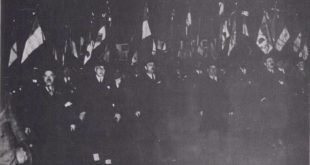SPEAKING BEFORE the Congress of Soviets on November 8, the second day of the November revolution, Lenin had said, “We shall now proceed to construct the Socialist order.”
Constructing any kind of order in a vast country like Russia would not be easy. The Bolsheviks had won the support of the soviets, but could they win the support of all Russia? As a matter of fact, not all the people in the country known as Russia were Russians. The tsars had gathered in under their rule many territories. On these territories lived people of many different nationalities, each speaking a different language. Could the Bolsheviks mold them all into one socialistic state? A number of political observers believed that the Bolsheviks would be unable to hold the power they had gained. The test was the elections for the Constituent Assembly, which began in late November.
Before the revolution, the Bolsheviks had demanded a Constituent Assembly. Even before they saw the results of the elections, however, they lost their enthusiasm for it. They had still less enthusiasm when the election returns were in. The Bolsheviks won only 175 out of 707 seats. The largest number of seats went to the Social Revolutionaries, who won 410. The Bolsheviks solved the problem by using soldiers to break up the Assembly when it met in January of 1918. Lenin later excused this action by saying that it was a time of crisis and that any government would have done the same to hold its power. Whether or not this was true, one thing was certain — there was no longer any democratic way to end the Bolsheviks’ power. On top of this, the Bolsheviks took control of the press and set up a secret police.
One of the biggest problems now facing the Bolsheviks was getting out of the war and they sent Trotsky to negotiate a peace treaty with Germany. The Germans demanded that the Russians give up Finland, Estonia, Latvia, Lithuania, the Ukraine and other territories. Altogether, it meant that Russia would lose one-fourth of its territory, one-third of its population and at least half of its industries. The Russians would not agree to this. They drew out the negotiations, hoping to be saved by further revolutions in Europe, but Germany wanted a quick settlement and ordered its troops to advance into Russia. When they threatened to reach Petrograd, the Bolshevik government moved to Moscow, which became the capital of the country.
Afraid that Germany might gobble up still more of Russia, the Bolsheviks finally agreed to the terms. They signed the treaty in the city of Brest-Litovsk, on March 3, 1918. Later, after Germany had lost the war, the Treaty of Brest-Litovsk was annulled and Russia was given back much of the territory it had lost; meanwhile, it was a bitter thing for the Russians to swallow. At the same time, the Bolsheviks could point out that they had kept their promise and made peace with Germany.
REDS AGAINST WHITES
They had made peace — and yet there would still be war. For one thing, the Allies who were fighting Germany decided to intervene in Russia and troops from Britain, the United States, France and Japan were soon on Russian soil. There were never very many of them and they were no real danger. The real danger to the Bolsheviks came from the “White” Russian armies organized by Generals Kolchak, Denikin, and Yudenich to fight against the new government. They were supported by the people who wanted a return of the monarchy.
There had been comparatively little bloodshed during the November revolution; the civil war that now raged in Russia more than made up for it. The Bolsheviks’ Red Army, led by Trotsky, fought back fiercer against the Whites. It was a cruel and terrible time, a time of horrors and atrocities committed by both sides, but the Whites could not agree among themselves. Besides, the chief concern of many of them was to win back their own lands, which had been seized by the Bolsheviks. For this reason they failed to get the support of the peasants. The peasants had no great love for the Bolsheviks, either, but without them the Whites could not hope to be successful. At first the Bolsheviks were defeated, but Trotsky proved to be a brilliant military leader and by the middle of 1920, the Bolsheviks had won the civil war.
By this time, too, several other important things had happened. The Bolsheviks had officially adopted a new name, the Communist Party. In the summer of 1918, members of the soviet at Ekaterinberg had killed the former Tsar Nicholas and his family; five of the killers were later executed. That same summer, Social Revolutionary terrorists had tried to kill Lenin, wounding him in the neck. In 1919, the Communist International, also known as the Comintern, was set up as an organization of Communist parties with the goal of speeding up the revolutionary triumph of communism all over the world.





